Rezeda Safiullina: ''No Tatar theologian of early 20th century denied that hijab was prescribed in Islam''
The columnist of Realnoe Vremya tells about who will win in the veil war: common sense, secularism or clerics?
The debate about Muslim hijabs, which started with the conflict in the Tatar village of Belozerye in the Republic of Mordovia, continues to escalate to the federal level. The number of those who expressed their opinions is impressive. Federal Minister and the head of Chechnya have already expressed their points of view to the representatives of influential media. Rezeda Safiullina, not only a scholar expert on Islam, but also a person who adheres to the rules of Islam, also decided to express her opinion on that topic.
The level of alarm
On the first day of February, declared in 2013 as Day of Hijab, for three consecutive years in the cities and settlements of our Republic there has been the campaign, participants of which cover their heads by veils in solidarity with Muslim women. If in the previous years the campaign was purely educational and it had an image-building character, this year it is impossible not to notice that the event has acquired the character of a kind of act of protest against the statement of Minister of Education of the Russian Federation Olga Vasilyeva, who supported the ban on wearing hijabs at schools, citing cases in Mordovia and Stavropol.
The local leaders of these regions have banned the wearing of hijabs for students and teachers at school and the Supreme Court recognised these decisions as legitimate. In both cases, the Supreme court's decision has left thousands of people confused.
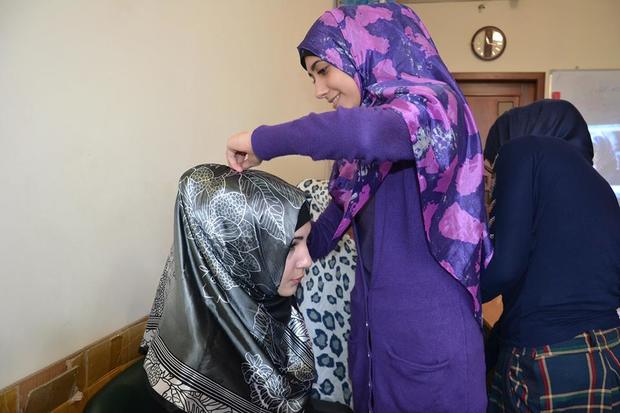
''For three consecutive years on the first day of February, declared in 2013 as Day of Hijab, in the cities and settlements of our Republic there marches the campaign, participants of which cover their heads veils in solidarity with Muslim women.'' Photo: arraid.org
The statement said by Vasilyeva is worrisome
The extent of alarm, which seized some of our compatriots in relation to the simple female veil, is striking, as well as the level of intolerance and xenophobia, which have been revealed in all its ugliness in the background of this story in an ordinary Russian school in the Tatar village, where students and teachers for refusing to take off a veil were subjected to obstruction, psychological pressure from the school management and officials.
I do not want to consider this event as a manifestation of Islamophobia at a household level, and yet such a behaviour of state officials may be regarded by believers as a manifestation of state policy in the sphere of religious freedoms. As the mufti of Tatarstan Kamil Samigullin rightly said, even if the attitude of the Minister of Education of Russia to the traditional Muslim veil is just her personal opinion and not the official position of the Ministry, such statement is a dangerous sign, as ''it de facto indulge the marginal forces that want to create unhealthy tension in our society and to break the fundamental unity of the multinational Russian people through the practice of religious discrimination.''
Such precedents with the ban on hijabs have seriously alarmed the Muslim community. Believers regarded these facts as the intensification of Islamophobia under the guise of a fierce fight against extremism and terrorism and they perceived it as open discrimination based on personal dislike of particular persons, and an insult to the foundations of their religion. The statements on bureaucratic lawlessness, restrictions against Muslims on religious grounds, insulting the feelings of believers and the infringement of the rights to freedom of conscience and freedom of religion, are getting louder and louder.
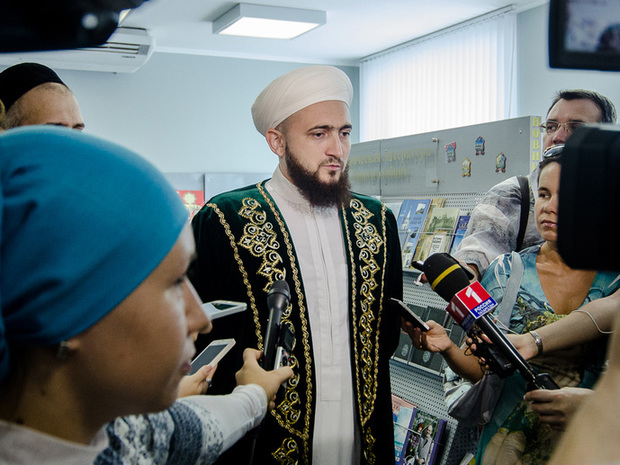
''As the mufti of Tatarstan Kamil Samigullin rightly said , even if the attitude of the Minister of Education of Russia to the traditional Muslim veil is just her personal opinion and not the official position of the Ministry, such statement is a dangerous sign». Photo: Oleg Tikhonov
''To take off hijab for her is the same thing as to be naked''
Supporters of the ban on hijabs don't want to hear and understand simple arguments cited by representatives of the Muslim religion, as well as by non-Muslim public figures, famous personalities, journalists, that the wearing of hijab does not contradict secularism and laws, that the hijab is not a matter of religious paraphernalia, they do not place their faith on display. It is the prescribed norm, the failure of which is unthinkable for the believer.
The non-believer sees in this only a form, but the believers in those forms see the meaning of their faith. Any Muslim woman will tell you that by hiding behind the hijab, i.e. veil, she feels protected from coveted looks, from the temptations. To take off the hijab for her is the same thing as to be naked.
Fortunately, we see that a large number of our compatriots, representatives of different nationalities and religious affiliation, still have a common sense. The evidence is the numerous interviews, the materials that have appeared in recent days in various media.
Hello to Channel One Russia
According to the results of a survey published by the Russian center of studying of public opinion (VTSIOM), every second Russian believes that the ban on wearing hijabs in schools is not right. This suggests that, overall, the country has a more tolerant attitude to the external manifestations of religion.
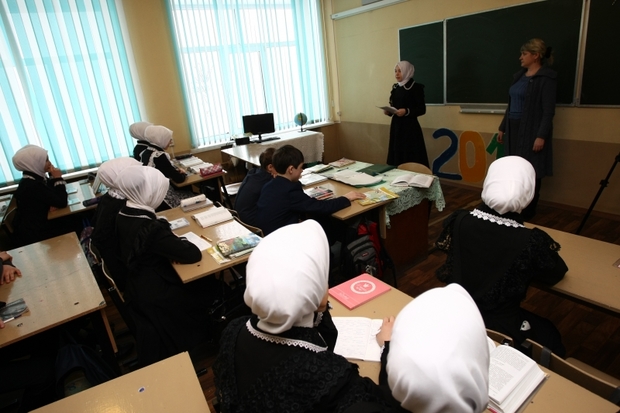
As a researcher, in recent years I have been engaged in comparative analysis of the religious discourse of the Muslims of the Volga-Ural region of Russia. The study of any institutional discourse allows to determine the current situation in society, formulating the criteria of objectivity, impartiality, credibility, truthfulness in the presentation of information and knowledge.
In this regard, it is confusing to observe how the media systematically distorts information and incites, do not be afraid this word, the hysteria against Islam and Muslims.
The question arises, why are they doing this? Who needs it? I have an impression that we are witnessing the formation of a virtual information space, which has little in common with the existing reality. It is true that ''people who could multiply knowledge, they work to the falsification of knowledge'' — the words of the head of the department of new media and theory of communication department of journalism of the Moscow State University Ivan Zasursky, which he cited speaking about manage of knowledge, its openness and accessibility to the modern society in his speech at the expert club polls Platform.
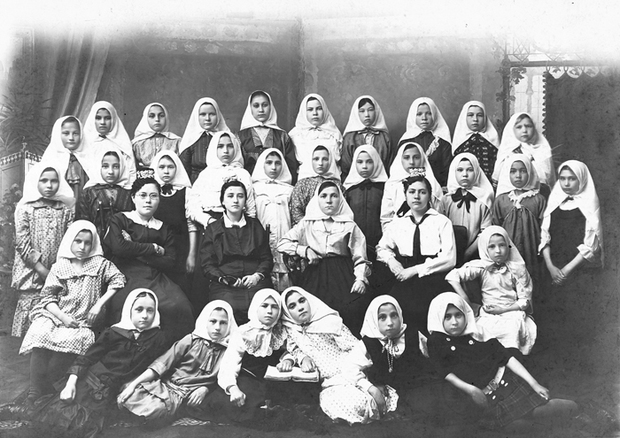
''It is enough to look at the numerous photos of the students of the Tatar madrasas and maqtabs at the beginning of the twentieth century, the heads of whom were tied with veils in the traditional way.'' Photo: pkzsk.info
The internal significance of wearing hijab
In recent years, secular Tatar national intelligentsia actively has actively discussed and is strongly transmitted historical and cultural construct, according to which the Tatar women did not wear hijabs in the last century. Their typical headdress was a small kalfak. The custom to cover hair with hijab is a tribute to modern fashion and foreign influence. The failure of these arguments appealing to historical traditions of the Tatars is obvious.
It is enough to look at the numerous photos of the students of the Tatar madrasas and maqtabs at the beginning of the twentieth century, the heads of whom were tied with veils in the traditional way. Many of us remember our grandmothers, who did exactly the same.
The Koran mentions the word ''hijab'' in two meanings: 1) a robe covering the whole body except the face and hands (Surah An-Nur, ayah 31 and Surah al-Ahzab, ayah 59); 2) ''covering'', ''covering of honour'' (Surat al-Ahzab, ayah 53). It was written by a famous Tatar theologian Musa Bigiev. The scholar calls for a broad understanding of the word ''hijab'': it implies not so much a physical covering (the cover of the face or body), but the moral side of the issue, i.e. the hijab, according to Bigiev, means respect for women, the need to respect the rights of women, protect their honour, reverence for women.
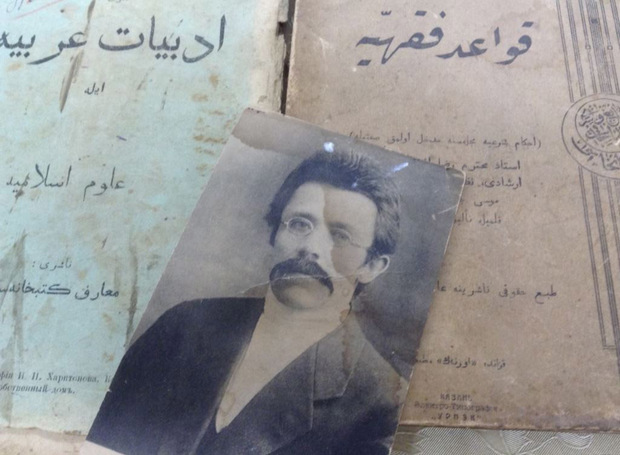
This understanding of hijab was also expressed the by the Supreme mufti of Russia Talgat Tadzhuddin: ''Veil is not a hijab, it is an honour of women.'' With regard to the discussions in the Tatar society of the early twentieth century on this subject, Musa Bigiev opposes hijab as ''veil of honour, pride, garments of good breeding and greatness'' to nikabu — veil covering the face, the need for which some conservatives, traditionalists, and the Tatar Muslim press were trying to defend at the time after the discussion on the topic of mandatory or non-mandatory niqab was open. Galimdzhan Barudi, Muhammad Hanafi Muzaffar, Riza Fahretdin and many others speculated on that topic.
So the question how a Muslim woman should look and what dress should guard her chastity worried the Tatar community more than a hundred years ago as well.
But, as we see, they were concerned about slightly different aspects of this issue, namely, whether a Tatar Muslim woman must cover her face with niqab. As for the hijab, no Tatar theologian of the early twentieth century denied that it was prescribed in Islam. Disputes caused a question as to whether the hijab must or not cover the face.
Who will win in the veil war: common sense, secularism or clerics?
As for modern information space, the topic of hijab in recent years has been one of the most urgent in the news, publications and comments on the pages in social networks. It's like a debate between supporters and opponents of different forms of hijab (one way or another, fashion is changing, and this applies to the Muslim community as well) and the problem of persecution or infringement of the rights of Muslim women for wearing the hijab. A reflection of all of this has appeared in recent days, publications and past events.
Apparently, the recent situation with the hijab in school has one obvious advantage for the Muslims. The Minister of Education of Russia, apparently, managed to do what nobody was able to do in recent years: to awaken and mobilise the minds on the unity of opinion on a specific issue. Now depending on how will be resolved the problem with the hijabs in schools, it will be possible to draw a conclusion what tendency has prevailed: 1) common sense 2) militant pseudo secularism with the Orthodox hue, or 3) clericalization, as such precedents strengthen the position of clerics who will try to exploit the situation to their advantage. Well, time will tell.